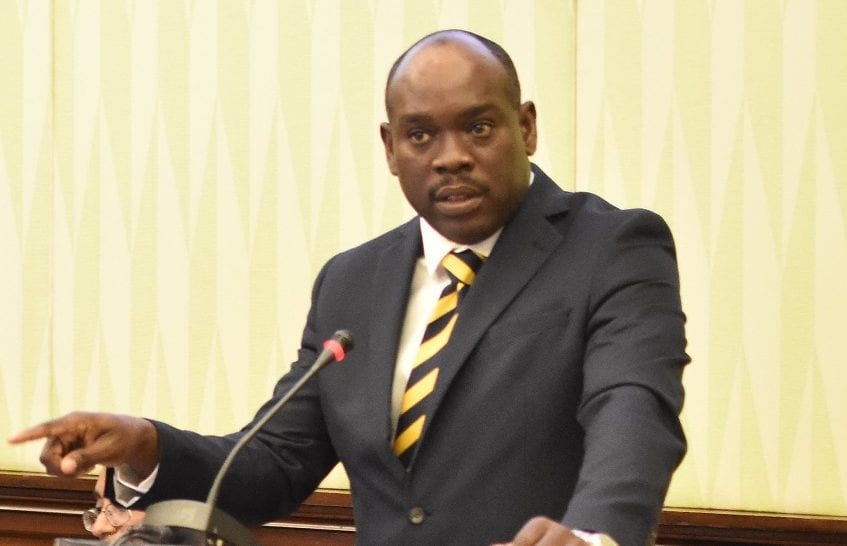The decision by Fitch Ratings to assign Barbados a ‘B’ rating with a stable outlook reflects the progress being made by the Mia Mottley administration on the macroeconomic front and that the sacrifices of residents were paying off, says Minister in the Ministry of Finance Ryan Straughn.
On Thursday, the New York-based financial services company said it had assigned a long-term foreign currency issuer default rating (IDR) of ‘B’ with a stable outlook. It also assigned a short-term IDR of ‘B’, a country ceiling of ‘B’ and senior unsecured debt level of ‘B’.
According to Fitch’s rating scale, the ‘B’ rating is highly speculative and indicates that default risk is present but a limited margin of safety remains. It also means that financial commitments are currently being met but capacity for continued payments is vulnerable to deterioration in the business and economic environment.
While welcoming the upgrade, Straughn acknowledged that there was still a lot of work to be done.
“We are not yet back to investment grade level, but this will ease the cost of borrowing for entities operating in Barbados, particularly at a time of rising global interest rates,” he said.
“We believe that once we can stay the course and we can complete the reform efforts under the Barbados Economic Recovery and Transformation (BERT) programme 2022, then this Government will be able to see the country through very tough times; therefore, we ask Barbadians to stay the course.”
The economist said the latest credit rating demonstrated confidence in the Government’s macroeconomic programme.
“More importantly, it reflects the sacrifices made by ordinary Barbadians over the past few years. After years of continuous downgrades under the previous government, this rating action signals an upgrade, which is a step in the right direction when compared to the current ratings by other agencies,” he said.
In its rationale, Fitch Ratings said the country’s latest ratings “balance high GDP per capita and governance scores, a strengthened external liquidity position, and a more favourable debt repayment profile following a comprehensive 2018-2019 restructuring, against its vulnerability to external shocks due to its heavy reliance on tourism, high public debt levels and limited appetite for domestic debt from local commercial banks”.
“The rating is supported by the recent International Monetary Fund (IMF) staff-level agreement to access the Resilience and Sustainability Trust (RST) with an accompanying Extended Fund Facility (EFF) programme which would underpin reform momentum and alleviate financing constraints, as well as Fitch’s expectation of a relatively quick reduction in the debt burden from high levels in the forecast period,” it explained.
Pointing to the 10.5 per cent economic growth during the first half of this year, the report noted that economic recovery has begun.
Fitch said it was forecasting real GDP growth of 9 per cent this year and three per cent in 2023, although recessions in key source markets such as the United States and the United Kingdom pose downside risks.
Pointing to the success of the first BERT programme which came to an end last month, Fitch noted that with the new IMF programme expected to “crowd in” other multilateral financing, this would provide ample financing for the projected fiscal deficits over the next two years.
The financial services company said it expected the Government to return to primary surpluses from this year, reflecting its commitment to bringing down debt, as it stated that the new IMF programme could help anchor achievements made to date and support future progress.
Fitch’s ratings come three weeks after Standard & Poor’s reaffirmed its ‘B-/B’ long- and short-term sovereign credit ratings on Barbados, and its ‘B-’ issue-level rating on Barbados’ debt.
In addition, S&P reaffirmed its ‘B-’ transfer and convertible assessment and issued a stable outlook in its September 27, 2022 rating.
Fitch said there were a number of factors that could individually or collectively lead to a negative rating action in the future, including the emergence of financial constraints such as a breakdown in relations with international financial institutions or failure to consolidate fiscal accounts, as well as a sharp reduction in external liquidity such as a deterioration in the current account deficit stemming from an external shock.
On the other hand, the country could receive a positive rating based on a sharp and sustained reduction in government debt-to-GDP ratio reflecting persistently high primary surpluses, diversification of financing sources including a full reopening of the domestic debt market, and progress on economic reforms that improve the investment outlook and led to higher growth trends.
Fitch said the current rating benefited from “very strong governance indicators”, as it pointed to the Barbados Labour Party (BLP) winning all 30 seats in the January 2022 elections, which it said provided a “strong mandate” to continue reforms that began in the BLP’s first term.
The report also made mention of the island’s well-capitalised and stable financial system, the high levels of foreign exchange reserves, and plans to shift to renewable energy sources that will lower the fuel import bill.
It noted that the domestic market was still recovering, following the impactful 2018/2019 debt restructuring, with commercial banks having limited appetite for new government papers.
Fitch said the limited uptake of the special one-off pandemic-related Treasury notes in November 2021 signalled that it may still take some time for the domestic market to recover.
“Financing since the debt restructuring has largely come from international financial institutions,” it added.




